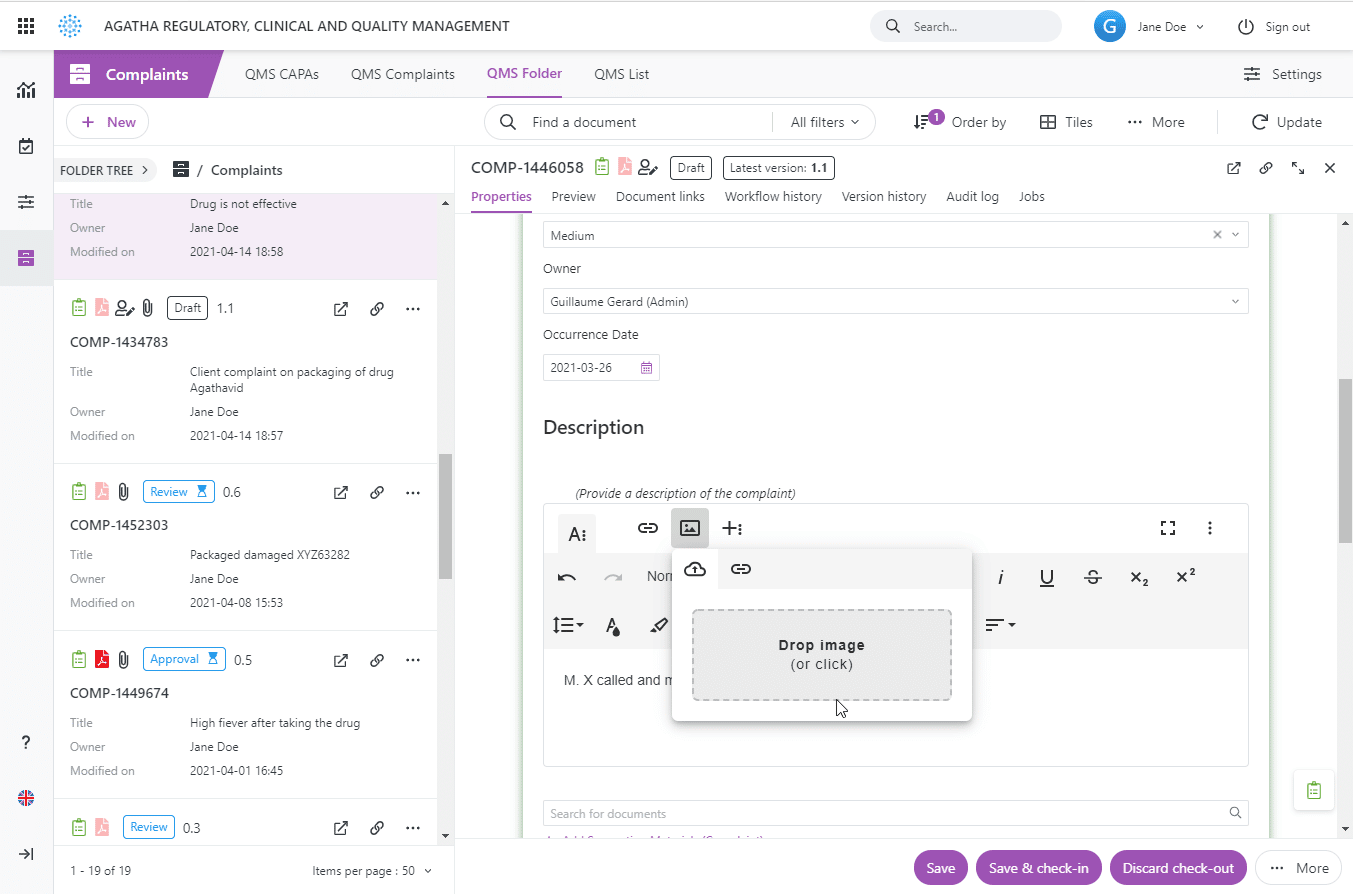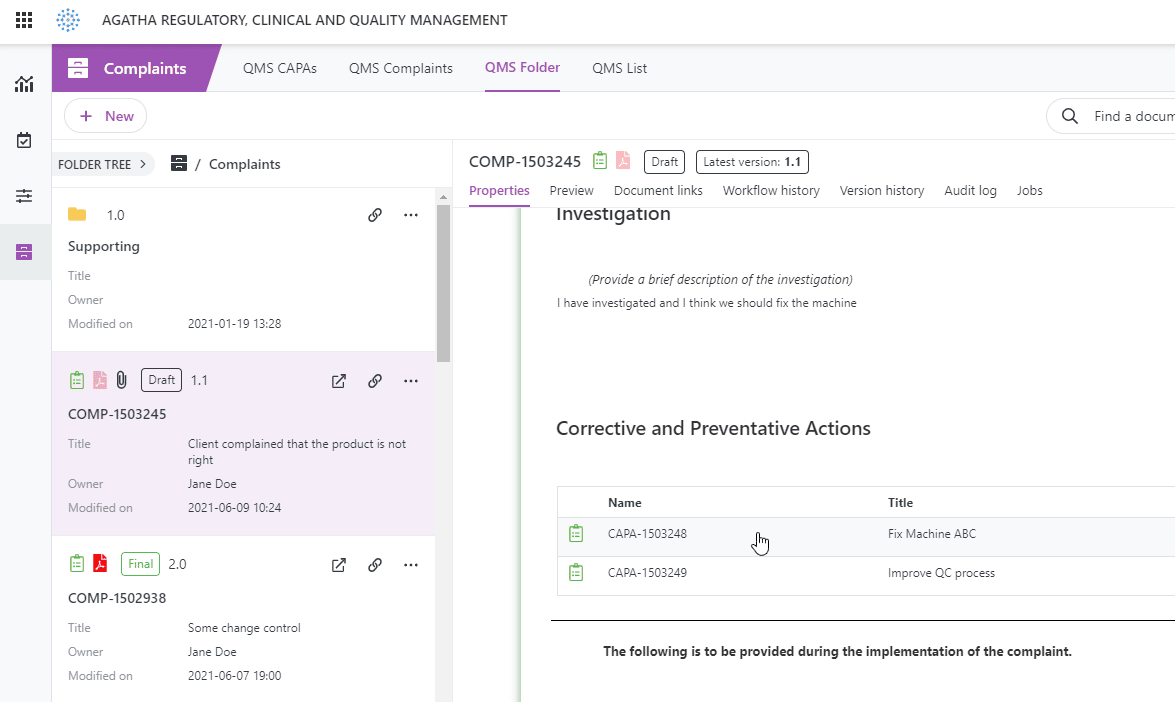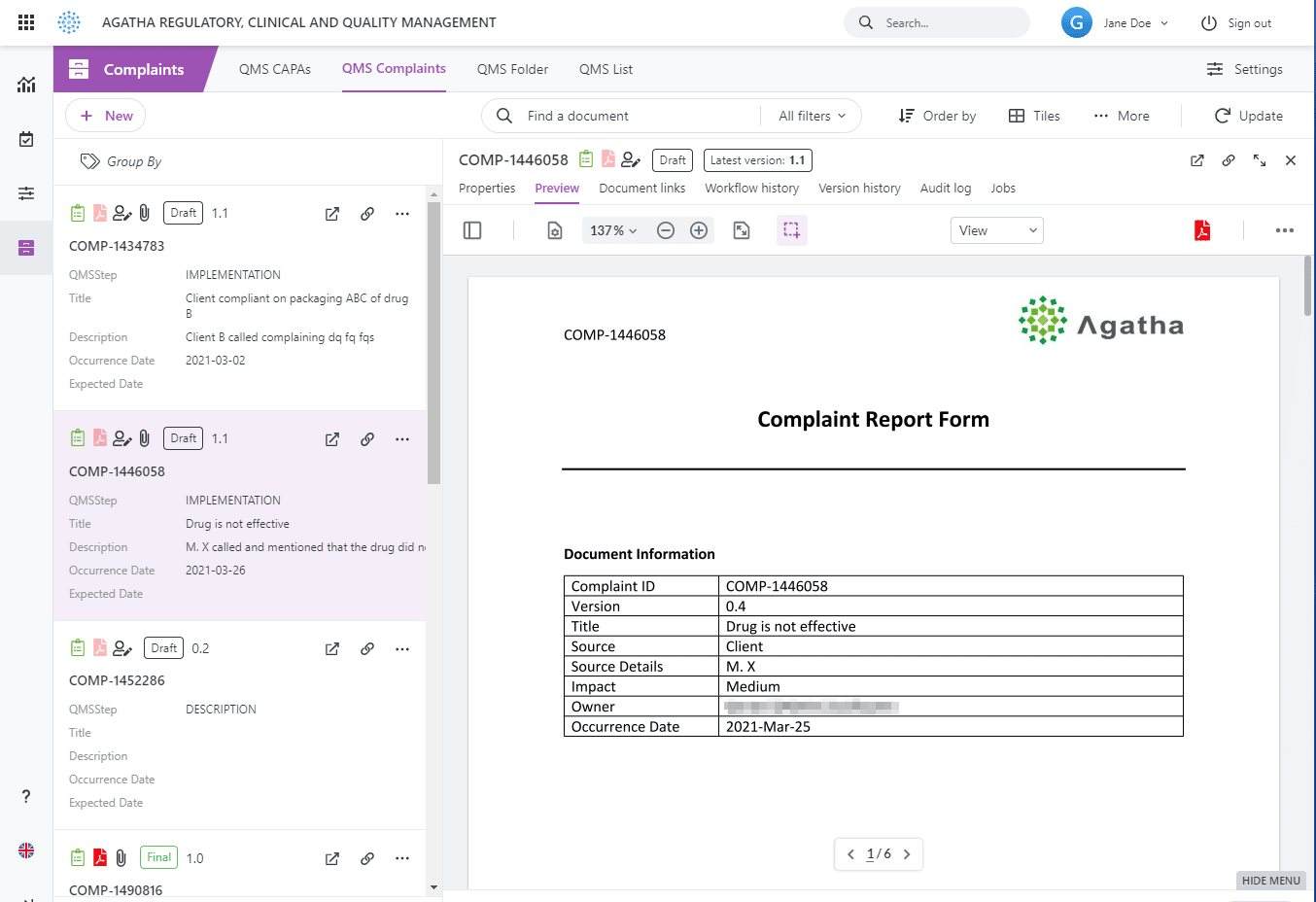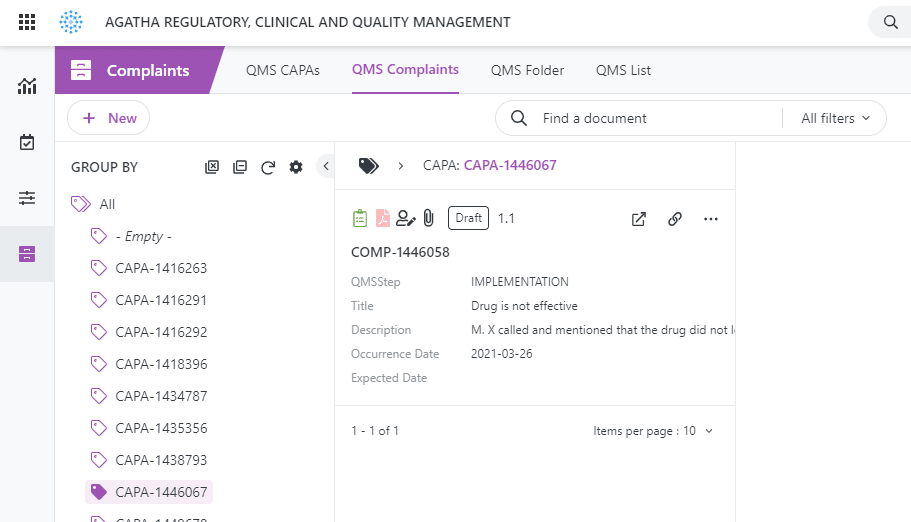Clinical QMS – Choose Agatha Quality as your clinical quality management system
Finally, a quality management system designed for life sciences clinical and compliance professionals. Every industry and discipline has unique quality management requirements and frameworks. And a generic quality management system designed for non-pharma manufacturing is a poor fit when addressing the GMP and GCP requirements of a pharma, biotech or medical device company.

Finally, a QMS for Life Sciences
Effectively managing clinical, compliance, and quality processes and protocols is a mission-critical task at life sciences companies. Quality improvements accelerate trials and improve the results of clinical studies, while quality failures can result in huge delays, added costs and major disruptions. Choosing the right solution for monitoring and managing quality processes in clinical trials and pharmaceutical manufacturing is a critical decision. It’s time to look at Agatha Quality as the foundation of quality for your ClinOps and GMP program..
Agatha Quality (QMS)
Agatha Quality (QMS) is a complete, ready-to-use quality management application for capturing deviations, documenting corrective and preventive actions (CAPAs), and managing change control processes during a clinical research project. Most vendors provide quality management forms that are targeted towards “widget” manufacturing, but Agatha QMS is focused on the key forms needed for ClinOps and life sciences GMP environments.
Risk-based monitoring and quality system
More than document management, QMS is an end-to-end quality management system. Combining forms, framework, documents, and workflows, Agatha QMS comprises a complete toolset for quality managers, preconfigured, validated, and ready-to-use but easy to adapt to specific process requirements.

Kiyuki Tanifuji
Group manager Development Planning Group, Clinical Development, Nihon Medi-Physics Co., Ltd.
How Agatha Quality supports compliance
Advanced Forms
Work with ready-to-use standard forms and processes, or adapt them to support your needs. Forms include rich text fields that allow the addition of images and formatted text. Use the form designer to update the look and framework of your forms.
A dynamic, multipart form supports all steps in a process from deviation to change control, adding appropriate sections based on information provided at each stage. Reviews, approvals, and assignments for actions are also built-in to help businesses reach their quality objectives.
Complete Metrics and Reporting
Get all the reporting you need with built-in dashboards and reports, generate custom reports and export any report to Excel or a generic CSV format.
Cross Workspace Reporting: You can also create views and reports across workspaces and export results to Excel for dashboard reports.
Complete Records
Get complete quality records with signatures and audit trails, ready for inspection. Agatha QMS is fully compliant with 21 CFR Part 11 and EU regulatory requirements.
Agatha’s quality management application is also fully integrated with other Agatha applications, making it easy to create references between them (eg. A CAPA can reference an SOP).
More Than An Online Record
QMS forms in Agatha can be converted to PDF at any point, resulting in an appropriately-format, signed electronic record.
The best way to know if an Agatha Application meets your needs is to try it out. And good news – we offer a free trial for Agatha Quality.
You Get More with Agatha Quality
Basic Preview and Annotations
Preview and annotate PDF and Office documents, and images in Agatha Quality’s report form.
Advanced Integration Toolkit
Use Agatha’s Rest API to allow applications to upload or export items from Agatha (includes documentation and sample code).
Cross Workspace Reporting
Create views and reports across workspaces and export results to Excel for dashboard reporting.
An End-to-End Process
A complete, closed-loop process captured in an expanding form, from initial issue to preventative action.
Inspection Ready
Create complete quality records with electronic signatures, recorded approvals, and audit trails, all ready for inspection.
Full Compliance
A validated system that is compliant with GxP requirements, EU regulations, and FDA 21 CFR Part 11.
Learn more about Agatha Quality and clinical quality management systems
What is a clinical quality management system?
A clinical quality management system (CQMS) is a software application used for quality monitoring during clinical research by pharmaceutical companies. Clinical research requires a QMS, as a well-designed clinical quality management system will help ensure that all procedures, processes, protocols, documents, etc., that occur throughout the entire course of a clinical study are managed effectively and audited for quality.
With the assistance of a clinical QMS, a organization operating in the healthcare industry (pharmaceutical, biotechnology, medical devices company, healthcare institution sponsoring clinical trials, or the clinical research organization conducting such clinical trials) will be able to implement the applicable regulatory standards, concepts, and methodologies needed to achieve the goals of clinical research.
QMS applications like Agatha Quality also play an important role in keeping clinical research compliant with regulatory requirements by international regulatory bodies, such as Good Clinical Practices (GCP), the European Medicines Agency (EMA), and the US Food and Drug Administration (FDA), and others.
What are the advantages of a clinical QMS?
Improved patient and consumer safety
A clinical QMS generates reliable data that an organization, its partners, regulatory and healthcare authorities, and other stakeholders can use for monitoring and improving clinical products and the lives of patients. Using a clinical QMS such as Agatha Quality gives clinical trial participants and end users of the results of clinical research the assurance that medications/treatments that they receive were developed using proper research.
Guaranteed regulatory compliance throughout the research process
Managing quality through a central application ensures regulatory compliance during the entire clinical trial process. This risk mitigation will include first-in-human studies to post-marketing surveillance of new pharmaceutical products.
Improved clinical research quality management
Reduce or eliminate repetitive quality issues during clinical studies such as unintentional non-compliance, insufficient staff training, insufficient supervision by management, lack of protocol clarity, and insufficient quality control in the collection and recording of data threatening patient safety/data integrity.
Agatha Quality clinical QMS offers a strong organizational structure to help pharmaceutical businesses systematically improve the overall performance of their clinical research, accomplish their quality control and training goals and complete clinical trials efficiently.
Proactive approach to quality assurance
A reactive approach is not enough for a quality management system (CQMS): good risk management practices are essential. Proactively managing clinical quality with a well-designed CQMS instead of reacting to issues related to investigational products when they occur avoids wasting valuable time and resources.
What are regulatory requirements for drug development and clinical studies?
The main regulatory requirements for any project of clinical research or clinical investigation conducted by an organization are:
Good clinical practice (GCP)
“Good Clinical Practice (GCP) is an international ethical and scientific quality standard for designing, conducting, recording, and reporting trials that involve the participation of human subjects. Compliance with this standard provides public assurance that the rights, safety, and well-being of trial subjects are protected, consistent with the principles that have their origin in the Declaration of Helsinki, and that the clinical trial data are credible.
The objective of this ICH GCP Guideline is to provide a unified standard for the European Union (EU), Japan, and the United States to facilitate the mutual acceptance of clinical data by the regulatory authorities in these jurisdictions.
The guideline was developed with consideration of the current good clinical practices of the European Union, Japan, and the United States, as well as those of Australia, Canada, the Nordic countries and the World Health Organization (WHO).”
ISO 14155:2020
The ISO 14155:2020 “specifies general requirements intended to:
- protect the rights, safety and well-being of human subjects,
- ensure the scientific conduct of the clinical investigation and the credibility of the clinical investigation results,
- define the responsibilities of the sponsor and principal investigator, and
- assist sponsors, investigators, ethics committees, regulatory authorities and other bodies involved in the conformity assessment of medical devices.”
European Medicines Agency clinical trials regulation
Regulation (EU) No 536/2014 states that:
“In a clinical trial the rights, safety, dignity, and well-being of subjects should be protected and the data generated should be reliable and robust. The interests of the subjects should always take priority over all other interests.”
What are the main elements of a clinical QMS?
The core elements of an effective digital quality strategy involve the following elements:
- Processes;
- Resources;
- Roles and responsibilities;
- Partnering;
- Risk management;
- Issue management;
- Knowledge management;
- Documentation that supports achieving quality;




